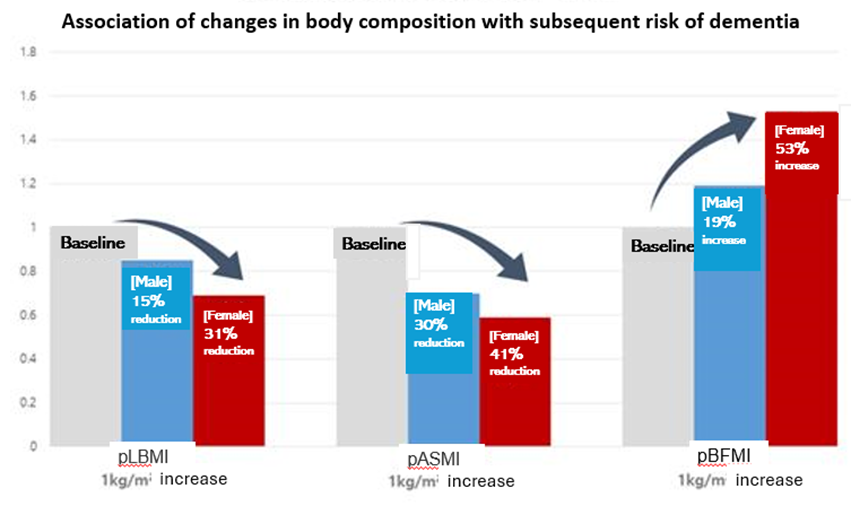Seoul National University Hospital confirms the effect of increased muscle mass and decreased fat mass on reduced dementia risk
Analysis of big data of approximately 13 million people confirms the association of changes in predicted body composition with subsequent risk of dementia
- Increased muscle mass reduces risk of dementia, increased fat mass increases risk of dementia: Body composition management is important
A research team at Seoul National University Hospital analyzed large-scale data from Koreans and found that an increase in muscle mass reduces the risk of dementia, while an increase in fat mass increases the risk of dementia. This study highlights that weight management alone is not likely to have a significant enough impact on dementia prevention. It demonstrates that changes in muscle and fat mass (changes in body composition) are significant predictors of dementia risk.
On October 30th, a research team led by Professor Kim Sung Min of the Department of Transdisciplinary Medicine and Professor Park Sang Min of the Department of Family Medicine announced the results of a study on the impact of changes in body composition based on gender and age on the risk of dementia based on big data from the National Health Insurance Service on approximately 13 million people.
Dementia is a representative neurodegenerative disease that causes a decline in mental functions such as memory, cognitive ability, and decision-making ability. There are more than 55 million patients worldwide, and about 10 million new patients are diagnosed every year. Obesity is known to be an important factor in the development of dementia, but the relationship between obesity and dementia shows inconsistent results depending on various indicators measuring obesity. The body mass index (BMI), which is commonly used as a measure of obesity, has a limitation in that it cannot distinguish between muscle mass and fat mass in the body. Therefore, it is necessary to assess the risk factors of dementia by considering body composition including fat and muscle mass.
In addition, since the composition of muscle mass and fat mass and the risk of dementia may differ depending on gender and age, the research team aimed to analyze the impact of body composition changes according to gender and age on the risk of dementia and present a more sophisticated risk prediction model.
This study was conducted on 13,215,208 adults without a history of dementia who underwent the first screening in 2009–2010 and the second screening in 2011–2012. The research team estimated lean body mass index (pLBMI), predicted appendicular skeletal muscle mass index (pASMI) and predicted body fat mass index (pBFMI) using previously validated prediction equations. Respectively, the indexes represent body composition (body weight minus fat), the muscle mass of the arms and legs, and body fat mass.
Afterwards, data from two health checkups were compared to measure changes in each indicator, and the effects of changes in muscle mass and fat mass on the risk of dementia were subsequently followed for approximately eight years using Cox proportional hazards regression analysis.

[Figure] Dementia risk according to changes in body composition: predicted lean body mass index (pLBMI) and predicted appendicular skeletal muscle mass index (pASMI) showed an increase in dementia risk, and an increase in body fat mass showed a tendency to increase dementia risk in both men and women.
The study results showed that the risk of dementia decreased significantly in both men and women as muscle mass increased. In men, the risk of dementia decreased by 15% when the predicted lean body mass index (pLBMI) increased by 1㎏/㎡, and in women, it decreased by 31%. When the predicted appendicular skeletal muscle mass index (pASMI) increased by 1㎏/㎡, the risk of dementia decreased by 30% in men and 41% in women.
On the other hand, an increase in body fat significantly increased the risk of dementia, and when body fat increased by 1㎏/㎡, the risk of dementia increased by 19% for men and 53% for women.
This trend was consistent across all groups regardless of age, gender, original weight, or weight change.
In addition, changes in muscle mass and fat mass in the age group under 60 years old were found to have a greater effect on the risk of dementia than in those over 60 years old, suggesting that increasing muscle mass and reducing fat mass from a young age may be effective in preventing dementia in old age.
The research team explained that this study is significant in that it is the first to verify the effect of body composition changes on dementia risk through a large-scale nationwide epidemiological study and that the results were derived using a reliable method without complex measurement equipment.
Professor Park Sang Min (Department of Family Medicine) emphasized, “This study clearly showed that muscle mass increase and fat mass decrease play an important role in dementia prevention,” and “It is essential to consider the effect of body composition management on dementia prevention rather than simply considering weight changes.”
Kim Sung Min, a research professor at the Department of Transdisciplinary Medicine, explained, “This study is a large-scale study that specifically reveals the importance of managing body composition from a young age for long-term dementia prevention,” and “Managing to increase muscle mass and reduce fat mass from a young age can be an important strategy for reducing the risk of dementia in old age.”
The results of this study were published in the latest issue of the Annals of Clinical and Translational Neurology, a journal of the American Academy of Neurology.

[Picture from left] Prof Kim Sung Min from Department of Transdisciplinary Medicine & Prof Park Sang Min from Department of Family Medicine